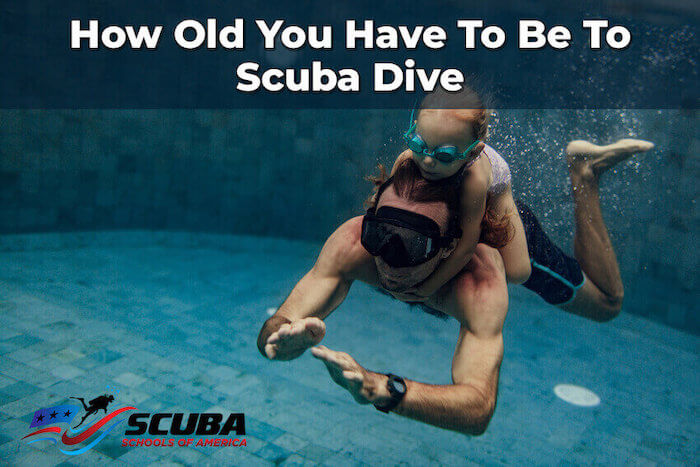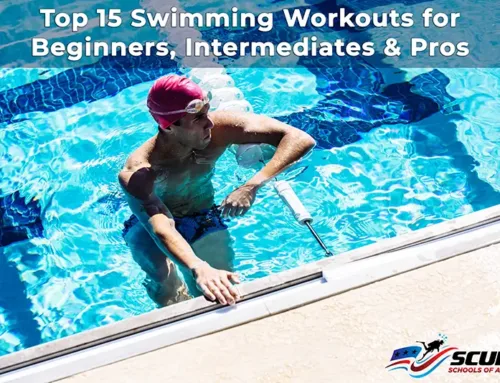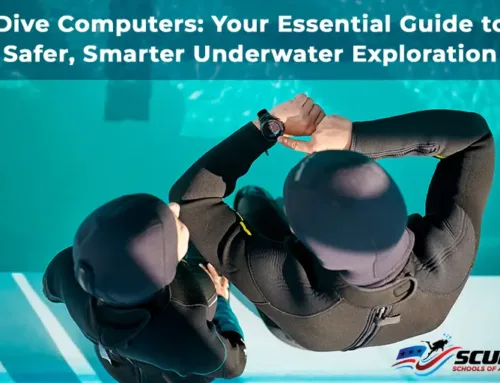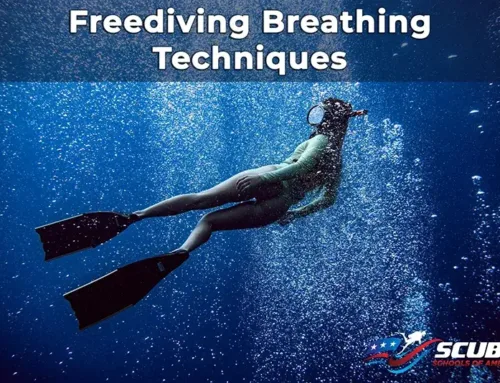Introduction: Scuba Diving Age Requirements
For adult divers, there are no specific age restrictions when it comes to scuba diving. As long as you’re healthy and meet all the safety requirements, you can enjoy the underwater world without any worries. But when it comes to children and adolescents below 18 years old, various national and international bodies set guidelines on how old one must be to pursue scuba diving.
Scuba diving can be a great activity for young people and can instill lifelong confidence. But it’s important to ensure safety for any participant, so age is taken into consideration when it comes to scuba diving. So, how old do you have to be to scuba dive? Generally speaking, the minimum age requirement for recreational scuba divers is ten years old since cognitive development does not usually begin before this time.
However, some dive outfitters may allow younger participants on tours with parental or guardian supervision. For technical dives, where the risks are higher and underwater conditions more unpredictable, the standards are higher and require a minimum of 12 or even 15 years old. Ultimately, the right decision should be made based on each individual’s maturity level and comfort in new environments and activities such as scuba diving.
How can I prepare my kids for scuba diving?
For parents who would like to teach their kids how to scuba dive, it is important to first go through a few basic steps to prepare them for the experience. Before enrolling in a certified scuba diving course, parents should make sure that their children are comfortable and familiar with the water. This could include teaching them how to swim, as well as activities such as snorkeling, where breathing techniques are practiced. Additionally, it is also useful for introducing children to some of the potential risks associated with being in the water and using safety precautionary measures while underwater.
Alongside physical preparation, emotional readiness is also a key factor when it comes to helping prepare kids for scuba diving. As this type of sport requires focus and concentration, ensuring that your child has the mental resilience and confidence needed can set them up for success with their scuba diving journey. Providing a steady foundation and making sure they feel secure and safe in any situation can give them the courage they need when facing their challenges head-on.
Scuba diving for kids
Scuba diving is an excellent way to get kids engaged in the exciting world of underwater exploration. With the SSI Scuba Explorer program, children as young as 6 can experience the joy of scuba under the watchful eye of a professional SSI Instructor. With more and more dive bases and resorts offering activities and guided dives suitable for younger divers, it has become much easier for families with children to enjoy all that scuba diving has to offer, meaning that everyone can experience the exhilaration and beauty of underwater life together.
The smile on a child’s face, when immersed in this environment, is an unforgettable sight; not only does it build trust between instructor and student, but it also holds an opportunity for learning and development above what can be taught inside a classroom setting. Scuba swimming is safer now than ever before with advances in technology, equipment design, dive safety practices, etc.
Why Children Love Scuba Diving
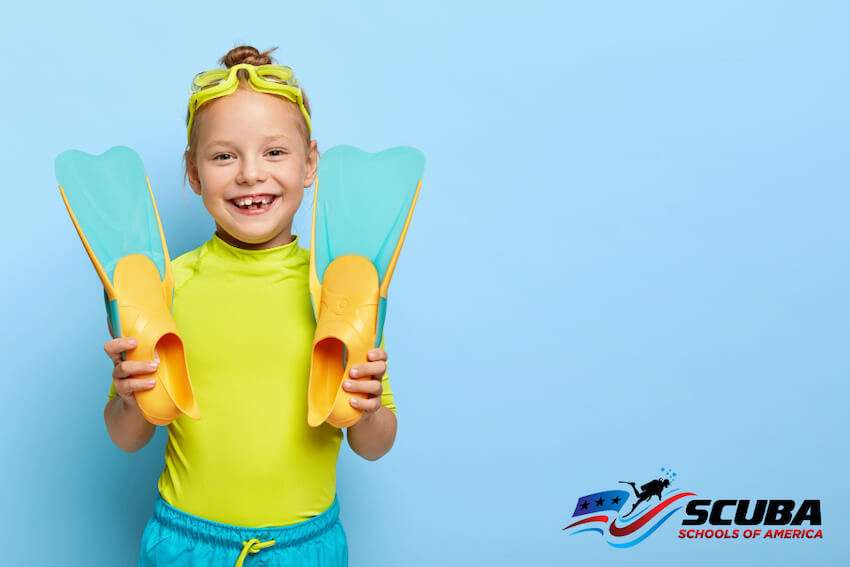
Scuba diving is great for kids and young adults. It helps them learn about nature and the environment. It also improves fitness and confidence. Plus, it teaches important safety skills.
Young people are often eager to explore the underwater world of scuba diving, and its easy access through shallow waters with safely trained instructors makes it a surprisingly accessible experience with incredibly fun possibilities! Through everything from snorkeling and simple dives to intense exploration in deeper waters, there’s something out there for everyone. Whether it’s enjoying the feeling of weightlessness under the waves or discovering rare marine life during a dive excursion, children will develop coordination, facility with tools/ gear, and knowledge of ecology and anatomy, among other things taught during lessons – they’ll even get certified!
How Old Do You Have to Be to Scuba Dive?
Scuba diving is a fascinating activity that people of all ages can enjoy. Different scuba diving agencies and organizations have different requirements in terms of age restrictions, as some insist on more strict standards than others. Generally speaking, individuals aged eight and over can begin trying out scuba equipment with the help of an instructor in a shallow depth, usually no deeper than 2 meters or 6.5 feet. However, this does not qualify them for certification; they must still meet the required age for certification according to that particular organization.
Scuba Age Limit
The minimum age requirement for most scuba diving certifications is typically 10 years old, at which point participants can begin their training courses and become certified divers. During these courses, the depth restrictions are limited to 12 meters or 40 feet (as opposed to 18 meters or 60 feet, which are open to those aged 12 and over). This restriction allows youngsters to go through the same program as adult divers, with greater safety precautions taken into account due to their immaturity and inexperience in such depths.
The Concerns About Diving At A Young Age
When thinking about the right age for someone to start scuba diving, it is important to consider the potential risks that come with this activity. As a pre-teen body may not be equipped to handle the physical strain of carrying the necessary equipment and performing in an underwater environment, it is understandable why instructors could be hesitant to teach youngsters how to dive. Furthermore, stress levels can be high while diving, and it is important for divers to have a certain level of maturity and confidence in order to make decisions under pressure. This means diving is best left until a person has reached an age when these attributes are more developed.
Diving also carries other safety concerns, such as dealing with strong currents or bad visibility; having enough experience generally improves one’s ability to deal with these situations in a safe manner. Therefore, although young people might want to learn how to scuba dive at an early age, caution must be taken regarding their readiness both physically and psychologically.
The Pros and Cons of Scuba Diving for Kids
The debate over whether it is appropriate to allow children to begin scuba diving is an ongoing one. It’s important to remember that all children develop physically and mentally at different rates, so what may be suitable for one child may prove dangerous or unenjoyable for another. Factors such as a child’s maturity, reasoning skills, and physical limitations should all be taken into account when evaluating if he or she is ready for scuba diving.
Safety should always come before any other considerations when it comes to scuba diving with children. Many countries have their own laws regarding the legal age in which individuals can dive under their jurisdiction, so these should be taken into account if traveling with your family or arranging a group lesson. Always check that any instructor or dive center you choose has suitable experience in teaching young people how to scuba dive – their enthusiasm and energy can be difficult even for experienced professionals!
What Sort of Scuba Courses Are Available for Kids Aged 8-10?
Scuba diving can be a great activity for kids to explore the mysterious depths of the ocean. Many instructors offer scuba courses for children aged 6-10 that introduce them to the necessary safety procedures and basics of scuba diving. The shortest and simplest courses are often just one-session Scuba Explorer, where kids are taught the very basics needed to stay safe underwater while also having some playtime in a pool or shallow water area under an instructor’s supervision.
More experienced and in-depth multi-day courses also exist, which teach children more complex scuba skills, such as mask clearing and buoyancy compensator use. These classes usually involve slightly longer sessions that cover topics piece by piece, with each session aimed at teaching only one specific concept related to scuba diving before moving on to the next as familiarity is gained. Children in these courses must stick to swimming pools or other shallow waters featuring a highly controlled environment with maximum depths measured at up to 4 meters or 12 feet.
How Old Do You Have to Be to Get Scuba Certified?
Scuba Diving Certification Courses for Kids Aged 10 and 11
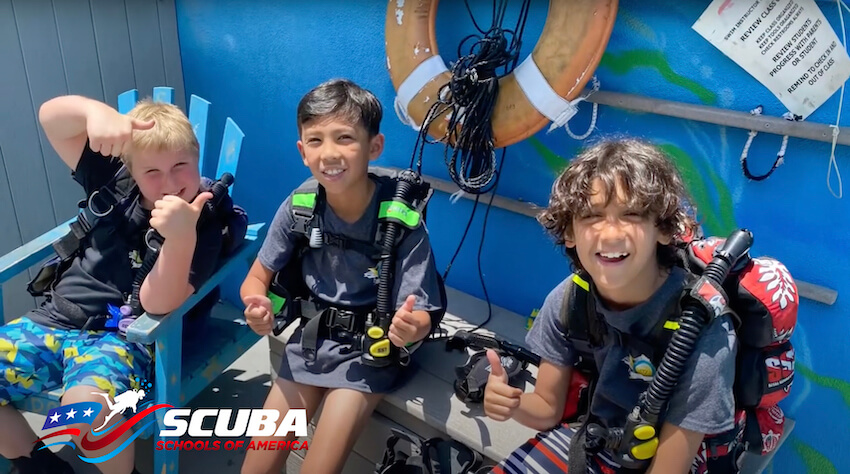
For children aged 10 and 11, there is now the opportunity to pursue a scuba diving certification. Children who enroll in these courses will be reading the same materials and taking the same examinations as adults, so it is important to evaluate their reading level before pursuing a certification. However, successful completion of an open water course or other certification courses will result in a child receiving a “ SSI junior” certification “– one that requires the same coursework as an adult certification.
At this age, children should have strong physical and mental abilities that can make them excel in a course like this. It is also important to consider whether this kind of activity is likely to be interesting or enjoyable for the child; this will then have an effect on how effective the program is likely to be. It might even help motivate them through any difficult aspects of the classwork that they might face. In general, though, it’s great to see that young kids now have access to pursuing certifications if they wish – something that has been denied them for many years.
Scuba Diving Certification Courses for Kids Aged 12 to 14
Scuba diving certification courses for kids aged 12 to 14 provide an excellent opportunity for young people to explore an exciting and foreign environment. Most scuba agencies offer junior versions of their adult courses, including open water/ basic certifications, advanced certifications, rescue diver certifications, and even specialty courses. The training these courses provide is comprehensive and gives the young participants the knowledge and ability to safely investigate a little-seen aquatic world.
Because of their age, children aged 12-14 may not lead dives or act as assistants to scuba instructors. Depth restrictions are also placed on these junior-certified divers. Most organizations limit children aged 12-14 to a maximum depth of 60 feet for the junior open-water certified divers, with some organizations allowing junior advanced open-water divers to descend up to 72 feet. Despite this, children can use their junior certifications to learn new skills as well as further what they already know about the underwater environment before beginning more mature diving activities.
Is Your Child Ready to Dive?
Many parents wonder if their child is mentally and physically ready to dive or if they should wait until they’re a bit older. When considering scuba diving for children, safety is always the top priority. The age restrictions for scuba certification are in place to ensure safety, but of course, nothing is 100% risk-free. Parents must consider the possible risks associated with their child learning how to scuba dive and make sure that their school or instructor has enough experience to answer any questions about introducing children to the sport.
Recognizing when your child may be ready to participate in a more demanding activity like scuba diving requires honest self-assessment, understanding your own comfort level with their ability, and talking with instructors or knowledgeable professionals before committing to a decision.
Scuba Diving Age Requirements at Scuba Schools of America
In conclusion, the age requirement for scuba diving at Scuba Schools of America is dependent on the specific course or program being offered. While some programs may have a minimum age requirement of 6 years old, others may require participants to be at least 10 years old. It is important for individuals interested in scuba diving to contact Scuba Schools of America directly to inquire about the age requirements for the specific course or program they are interested in. By ensuring that participants meet the age requirements, Scuba Schools of America can provide a safe and enjoyable diving experience for individuals of all ages.

